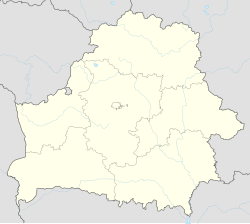Bruzgi
| |
|---|---|
Village | |
| Coordinates: 53°33′19″N 23°40′54″E / 53.55528°N 23.68167°E | |
| Country | Belarus |
| Region | Grodno Region |
| District | Grodno District |
| Time zone | UTC+3 (MSK) |
| Area code | +375-15 |
 | |
Bruzgi (Russian: Брузги) or Bruzhi (Belarusian: Брузгі) is a village in Grodno District, Grodno Region, in western Belarus.[1] It is part of Odelsk rural council (selsoviet) and is located close to the border with Poland. The Kuźnica-Bruzgi border crossing is located near the village. Klachki and Trubka are two villages nearby.
History
According to the 1921 census, Bruzgi had a population of 151, entirely Polish by nationality and Catholic by confession.[2]
During World War II, Bruzgi was occupied by the Soviet Union from 1939 to 1941, then by Nazi Germany until 1944, and then re-occupied by the Soviet Union afterwards.
Between 1940 and 1959, the village served as the administrative center of Bruzgi rural council (selsoviet). Until 2002, it was part of Padlabyennye rural council.[3]
21st century
In 2021, refugees, primarily Iraqi, entered the vicinity of Bruzgi, intending to depart from there to cross the Polish Border[4] at Kuźnica.[5] In response, the Polish government declared a state of emergency, stationing over 12,000 troops at the border. Politicians from Poland and the European Union accused Belarusian President Alexander Lukashenko of using the migrants as a form of "hybrid warfare" to destabilize Poland and other EU member countries.[6]
References
- ^ [Назвы населеных пунктаў Рэспублікі Беларусь: Гродзенская вобласць: нарматыўны даведнік / І. А. Гапоненка і інш.; пад рэд. В. П. Лемцюговай. — Мн.: Тэхналогія, 2004. — 469 с. ISBN 985-458-098-9 (DJVU).]
- ^ Skorowidz miejscowości Rzeczypospolitej Polskiej. Tom V (in Polish). Warszawa: Główny Urząd Statystyczny. 1924.
- ^ Решение Гродненского областного Совета депутатов от 20 сентября 2002 г. № 100 О решении вопросов административно-территориального устройства Гродненского района
- ^ "Belarus escorts 1,000 migrants towards Polish border". the Guardian. 8 November 2021. Retrieved 8 November 2021.
- ^ AFP, Mary Sibierski and Bernard Osser for (8 November 2021). "Migrants Massing at Border With Belarus Help, Poland Says". The Moscow Times. Retrieved 8 November 2021.
- ^ "Hundreds of migrants head toward Polish-Belarusian border". POLITICO. 8 November 2021. Retrieved 8 November 2021.


